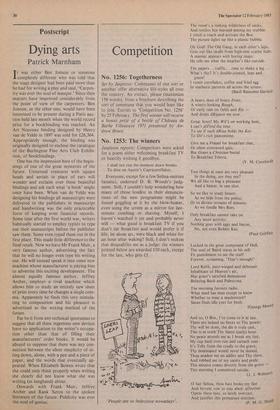Postscript
Dying arts
Patrick Marnham
It was either Ben Jonson or someone completely different who was told that the stage designer had been paid more than he had for writing a play and said, 'Carpen- try was ever the soul of masque.' Since then matters have improved considerably from the point of view of the carpenters. Ben Jonson, or the other one, would have been interested to be present during a Paris auc- tion held last month when the world record price for a bookbinding was reached. An Art Nouveau binding designed by Henry van de Velde in 1897 was sold for £26,364. Appropriately enough, the binding was originally designed to enclose the catalogue of the Burlington Fine Arts Club Exhibi- tion, of bookbindings.
One has the impression here of the begin- nings of one of the great mysteries of the future. Unisexual creatures with square heads and aerials in place of ears will wonder and exclaim over these beautiful bindings and ask each what 'a book' might once have been. When van de Velde was designing his bindings all manuscripts were delivered to the publishers in manuscript and handwriting was the only practicable form of keeping even financial records. Some time after the first world war, writers habitually started to employ typists to type out their manuscripts before the publisher saw them. Some even typed them out in the first place. This made little difference to the final result. Now we have Mr Frank Muir, a very famous author, advertising the fact that he will no longer even type his writing out. He will instead speak it into some new machine whose manufacturer is paying him to advertise this exciting development. The almost equally famous author, Jeffrey Archer, employs a rival machine which allows him to study an entirely new sheet of print every time he changes a single com- ma. Apparently he finds this very stimula- ting to composition and his pleasure is advertised as the writing method of the future.
Far be it from any technical ignoramus to suggest that all these ingenious new devices have no application to the writer's occupa- tion other than that of filling their manufacturers' order books. It would be absurd to suppose that there was any con- nection between the silent simplicity of sit- ting down, alone, with a pen and a piece of paper, and the words that eventually ap- peared. When Elizabeth Bowen wrote that she could only think properly when writing she clearly did not know what she was writing (in longhand) about.
Onwards with Frank Muir, Jeffrey, Archer and Rank Xerox to the spoken literature of the future. Publicity was ever the soul of genius.






































 Previous page
Previous page